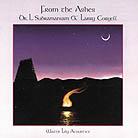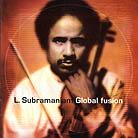September 1999
Alexander is well known for providing a spontaneous, non-rehearsed but comfortable setting for his musician guests in the Christ The King Chapel of St. Anthony’s Seminary in Santa Barbara, California. These pagan pursuits traditionally commence late at night to proceed well into the early morning hours, and a Persian carpet on loan from a neighboring dealer is often cited as the common ground accessory upon which the artists congregate. The ensuing improvisations, barely sketched out a priori, are recorded for posterity’s sake on a highly customized, all vacuum-tube chain of recording equipment provided by audio engineer savant "Baron" de Paravicini of E.A.R fame. Kavi Alexander eschews any filtering, compression, equalization, limiting or noise reduction and is a devotee of the minimalist, classic Blumlein microphone techniques. While these latter aspects undoubtedly hold great attraction for purist audiophiles and do make for superb recordings, the Waterlily label can be an equally attractive tributary for gold-straining music lovers primarily interested in artistic content and only secondarily concerned with state-of-the-art delivery. One does have to leave the fast-lane city life behind to get absorbed in the reflective mood that is a trademark of, and suitably emblematic to, the entire Water Lily oeuvre. The image of the eponymous flower evokes a serene, tranquil atmosphere heavy with Oriental symbolism of worldly transcendence, and the album under review is a prime example of, and requires, such a spirit of approach. While all four tracks, each approximately 10 minutes in length, are explorations of basic thematic or chordal building blocks agreed upon just one day previous, the artists have worked together since 1987 and each is no stranger to trans-cultural, genre-crossing projects. Subramaniam has recorded extensively with Western jazz musicians such as Herbie Hancock, Stephane Grappelli, Maynard Ferguson, Hubert Laws and Stanley Clarke, while Coryell has embarked on multiple collaborations with Hindustani bansuri flutist Hariprasad Chaurasia. With the exception of the accompaniment by the traditional Indian Tamboura drone, this recording is a pure acoustic duet between two instruments, violin and guitar. Their masters have transcended the boundaries of their respective musical backgrounds and can meet and engage the other within whatever context has been decided upon as suitable for the occasion. In this instance, it is decidedly Indian in flavor though atypical influences, compliments of Coryell’s jazz influences, abound. Three aspects of this recording should strike even the casual listener as utterly remarkable: How fluent Larry’s guitar artistry accommodates the raga modalities, as though wearing a Shree Baba cap was by now second nature -- perhaps it indeed is. Furthermore, how his Western harmonic training -- which essentially is a very alien ingredient to Indian classical music that revolves solely around melody and rhythm -- adapts to the intrinsic challenges. His guitar voicing retains the peculiar resonant shimmer of the Indian instrumental idiom while he simultaneously injects altered chords that stretch the harmonic seed material inherent in the microtonal Eastern scales to introduce novel inflections. But more impressive even than the technical and timbral ramifications is the pure chemistry between the musicians. Improvisation depends on a shared psychic space nearly outside of time -- in other words, the present moment, the crucible of Zen. Ideally, each player intuitively anticipates what the other is going to do nearly before it’s heard, and responds not by rote but by un-self-conciously culling from the great space of creative freedom. Then even the artist himself doesn’t know what will transpire until afterwards when he has observed himself as a mere conduit for inspiration -- the hollow bamboo image of Eastern thought upon which the Divine can blow only in the total absence of self-centeredness. It’s precisely in this arena where "From the Ashes" rises above many other fine Waterlily projects, into a rarefied realm of near magical mystery. Both Mani -- as Subramaniam is known amongst friends -- and Larry are incredibly "on" throughout the entire recording session. Periods of "downtime" -- when musicians paddle in place waiting for the next inspirational wave to come along and ride for as long as they can remain atop - are very few and far between. Their lyrical phrasing, Indian-style, hovers weightlessly between minor and major modes -- levitating in full lotus you might say -- and the explorations of the relationships between notes in the raga scale lay bare subtle tensions and a shifting hierarchy of focus, quite unlike typical Western materials where a clear root harmony and base note defines the center of gravity. Surprisingly, the second movement entitled "Beyond the Flames" is actually set up around a simple Western progression of I, IV, VII, V which intensifies the emotional effect of an aching sweetness. Coryell alternates between steel and nylon strings and plays both twelve- and regular six-string guitars. The vibrato-less violin, preternaturally fluent into the highest flageolet, contrasts with the more robust earthy guitar, and the melodic material is filled with a somber, tender and slightly melancholy mood. The entire album truly is a musical dialogue between friends one of whom carried in his heart an unusually heavy burden. Throughout the recording session, Subramaniam kept on himself a little bag filled with the ashes of his beloved wife Viji that he was to scatter above the Ganges River on his subsequent flight to his country. This tangible reminder of personal loss must have added tremendous poignancy and depth to the emotional context in which this recording - his very first after Viji’s death - took place. I predict that whosoever will take the trouble to search out From the Ashes will find himself compelled to return to its quiet splendor many a time. Such journeys might quite possibly lead then into an internal space that is very quiet, harmonious and strangely unconcerned with the up-and-downs of one’s daily life routine. As if discovering one recording of such depth wasn’t splendid enough, lightning struck our reviewer twice in the same month with the aptly titled album Global Fusion by L. Subramaniam again. The commonly used moniker World Music should, for accuracy’s sake, be separated into Ethnic Music -- traditional music of intact cultures such as Irish or Tibetan or Senegalese, performed in the traditional way - and Global or Ethnic Fusion in which elements of different musical traditions are combined to create new hybrids that were unimaginable prior to our World becoming the Global Village it is today. Subramaniam’s Global Fusion on the excellent French label Erato follows From the Ashes in spirit, but Mani’s violin is partnered here with Japanese Koto on one track, Chinese Erhu on the next, and the remaining three compositions feature African chorus, solo Indian vocals and the guitar of Jorge Strunz of Strunz & Farah fame. Jorge already collaborated with the Indian violinist on Milestone’s Spanish Wave [9114-2, 1984] from which one sublime track was reworked by Mychael Danna for the movie soundtrack Kamasutra, which featured Subramaniam, as did the soundtrack to Mississippi Masala. (This bit of history is injected here to convince those listeners who consider themselves of "conservative" taste to take a step on the wild side -- it’s not as outlandish, strange or "Westcoast" as it may seem!) The sound of the bowed erhu is the most recognizable of Chinese instruments to the average Western listener, and the Japanese koto harp, next to the Shakuhachi bamboo flute, is its Nipponese equivalent. Discovering these archetypal instruments in a free-form dialogue with an Indian violin, in the case of the erhu to tabla accompaniment while the tamboura does the honors for the koto, seems profoundly logical once presented as it is here -- so gorgeous that this, quite simply, is music to get lost in and drift away towards the Great Unknown. Color me speechless, but the three central tracks of Global Fusion, one featuring the stunning solo vocals of Kavita Krishnamurti, are truly breathtaking in beauty and should come unadorned by adjectives no matter how fancifully chosen. How about supramani-ficient? Two different albums, one shared artist, two winners -- ah, what heavenly arithmetic. GO BACK TO: |
 Dr. L. Subramaniam
& Larry Coryell - From the Ashes
Dr. L. Subramaniam
& Larry Coryell - From the Ashes Detour/Erato
3984-25495-2
Detour/Erato
3984-25495-2![[Reviewed on Gold CD]](../format/regcd.gif) A Meeting by the River,
the joyous guitar collaboration of Ry Cooder and Vishwa Mohan Bhatt, must arguably be the
most widely known of Kavi Alexander’s adventurous impromptu pairings of world-class
musicians on his Water Lily label. From the Ashes deserves to become another gilded
peacock feather -- and, in this listener’s opinion, one of the largest, most
prominent in Alexander’s already richly adorned cap. While not all artistic projects
of his can be said to be equally successful in musical terms, none can be accused of
anything other than courageous eclecticism. His latest experiment -- to mate Southern
Indian violin virtuoso par excellence, L. Subramaniam, with celebrated American guitarist
Larry Coryell -- proves nothing less than spectacular.
A Meeting by the River,
the joyous guitar collaboration of Ry Cooder and Vishwa Mohan Bhatt, must arguably be the
most widely known of Kavi Alexander’s adventurous impromptu pairings of world-class
musicians on his Water Lily label. From the Ashes deserves to become another gilded
peacock feather -- and, in this listener’s opinion, one of the largest, most
prominent in Alexander’s already richly adorned cap. While not all artistic projects
of his can be said to be equally successful in musical terms, none can be accused of
anything other than courageous eclecticism. His latest experiment -- to mate Southern
Indian violin virtuoso par excellence, L. Subramaniam, with celebrated American guitarist
Larry Coryell -- proves nothing less than spectacular.